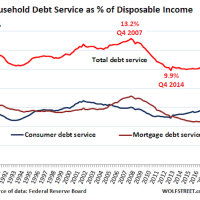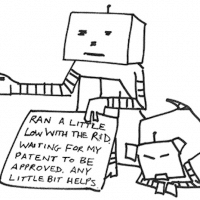-
Venezuela’s embarrassment of riches?
Letting the law of capitalist value govern society makes building socialism almost impossible because, even if the general guidelines of capitalist value seem to be acceptable, all it takes is for the market to plunge for you to lose your bearings entirely.
-
Confronting Cinema’s Fascist Unconscious with Maxximilian Seijo
In this episode, Money on the Left cohost Maxximilian Seijo (@maxseijo) expands upon the argument made in his video essay, “Inglorious Basterds: Nazi Desire Fully Employed,” which takes a neochartalist lens to Quentin Tarantino’s Inglorious Basterds (2008).
-
Where the debt slaves are the most vulnerable
This type of chart is trotted out constantly these days to show that American households are in fabulous shape when it comes to their ability to service their blistering record debts.
-
Job Guarantee as Historical Struggle with David Stein
In our inaugural episode, we consider the recent resurgence of full employment politics in the United States from both a political and historical perspective with historian David Stein (@davidpstein).
-
There is a structural crisis of capitalism
In this in-depth interview conducted in Dakar, Samir Amin speaks on a wide range of topics: globalisation; generalised monopoly capital; the alarming growth of inequality; the role of the state in the neoliberal era; globalisation and delinking; capitalism and modernity; the return of fascism in the contemporary capitalist world, and more.
-
Marx and the cinema
Dennis Broe traces the history of the representation of labour on screen, and finds inspiration for celebrating May Day and continuing Marx’s struggle against capitalism.
-
Chávez The Radical XIV: “we can’t convert everything we produce into merchandise”
In Chávez The Radical XIV, Chávez reflects on the contradictions of public planning and the transition to a socialist economy, within a system that remains dominated by capitalism.
-
Morales hits back at right-wing national representatives at the Summit of the Americas
Bolivian President Evo Morales hit back today at right-wing national representatives, including U.S. Vice President Mike Pence, who attended this weekend’s Summit of the Americas in the Peruvian capital Lima.
-
Jeremy Corbyn has a long and honorable record of opposing fascism, racism and anti-semitism
The Labour leader played an active part in organising against and resisting the National Front in the late ’70s.
-
Technology and capitalism 150 years after Das Kapital
Today, one hundred and fifty years after the publication of the first volume of Capital, Marx remains our contemporary.
-
The vision of the new society in Marx’s Capital
Marx’s Capital has been heralded for many things, but providing an exhaustive account of a future socialist society isn’t one of them.
-
Gender and capital 150 years later
We are witnessing an era of conservative backlash on gender rights. Nearly across the board, women make less than men, make up a majority of those in poverty (70% of those in extreme poverty), and face the real prospect of becoming a victim of sexual violence (1-3 internationally).
-
U.S. trade deficits, Trump trade policies, and capitalist globalization
Understandably concerned about the consequences of the large and sustained U.S. trade deficit, many workers have grown tired of waiting for so-called market forces to produce balance. Thus, they cheer Trump administration promises to correct the imbalance through tariffs or reworked trade agreements that will supposedly end unfair foreign trade practices.
-
Today’s capitalism was born in slavery
By 1830, one million Americans, most of them enslaved, grew cotton. Raw cotton was the most important export of the United States, at the center of America’s financial flows and emerging modern business practices, and at the core of its first modern manufacturing industry.
-
Enclosed thinking
In a slave society, one can argue, the interest of the slaves lies in keeping the slave owner happy, for otherwise he is likely to flog and whip them mercilessly which would cause them great agony. Likewise in a caste society, one can argue, the interest of the Dalit lies in being as inconspicuous as possible, in not ‘polluting’ the upper castes through his presence, for otherwise he is likely to be beaten and lynched.
-
Does capitalism depend on credit?
Credit is essential for the continuation of capitalism but also a major source of its instability, writes the Marx Memorial Library.
-
What do we mean by socialism?
What the hell is socialism, anyway? Over the last decade, it has been one of the most frequently looked up words in the Merriam-Webster dictionary. And it’s easy to see why so many people feel the need for clarification.
-
Oscar Lopez Rivera calls U.S. intervention in Puerto Rico ‘biggest experiment in neoliberalism’
Oscar Lopez Rivera, the anti-colonial leader from Puerto Rico, has criticized the United States’ callousness and “experimental” approach towards the U.S. colony.
-
Where does women’s oppression come from?
The liberation of women must be at the heart of the struggle for socialism, argues the MARX MEMORIAL LIBRARY
-
The robot, unemployment, and immigrants
For every industrial robot introduced into the workforce, six jobs are eliminated. – Since a few days, Amazon has started Amazon Go. The idea is simple: a shop where you go in, take whatever you want from the shelves, and the cost goes automatically to a magnetic card that you carry.




















